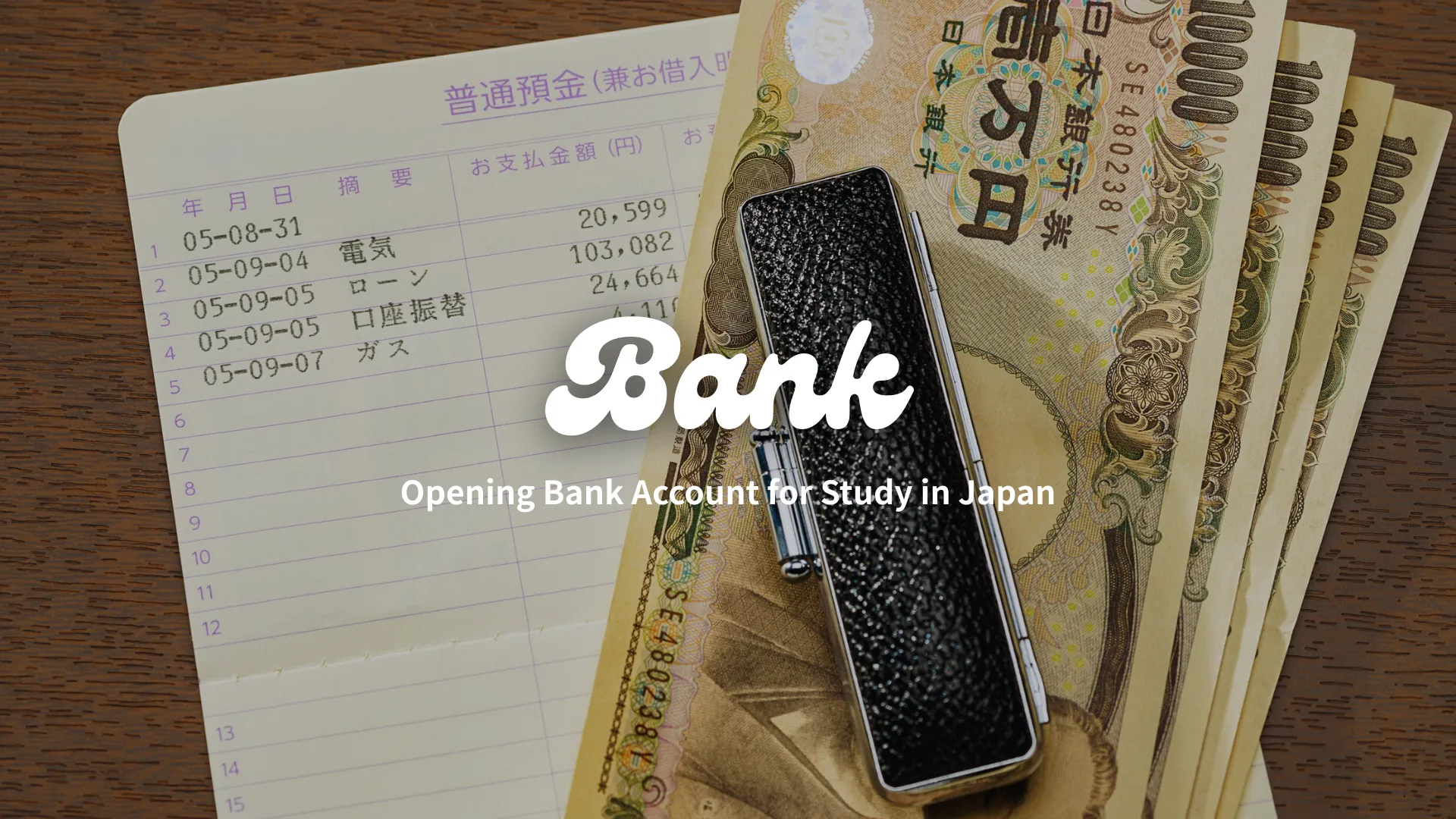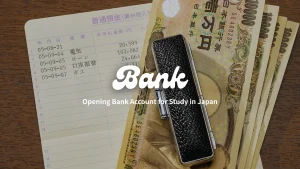Learn how to open a bank account in Japan as an international student. Step-by-step guidance, recommended banks, required documents, and useful tips for a smooth process.
Want to learn Japanese in Japan? Ask any questions!
Apply with Travelife Japan to receive personalized guidance, application support, and a smoother enrollment experience.
Why Opening Bank Account
Opening a bank account in Japan is more than just a formality for foreigners living, working, or studying in the country; it’s a crucial step toward a hassle-free and integrated lifestyle. The significance of having a local bank account extends beyond mere convenience, touching various aspects of daily life and providing a seamless way to navigate the financial intricacies of living in Japan. Here’s a breakdown of the key benefits:
- Salary Deposits
For expatriates working in Japan, having a local bank account is often a requirement for employment, as it enables direct deposit of salaries. This system ensures timely and secure access to your earnings, streamlining the process of receiving income and enhancing your financial stability in Japan. - Mobile and Internet Contracts
Setting up contracts for mobile phones and internet services often requires a Japanese bank account for automatic bill payments. This requirement underscores the importance of a local account for accessing essential communication services, ensuring you stay connected. - Access to Financial Services
Opening a bank account in Japan grants you access to a wider range of financial services, including credit cards and loans. This access can facilitate your integration into the local economy, offering opportunities for financial growth and investment that may not be available with a foreign bank account. - Reduced Transfer Fees
International money transfers can be costly, but a Japanese bank account significantly reduces these fees. Whether you’re sending money abroad or receiving funds from home, having a local account makes these transactions more economical and efficient, saving you money and hassle. - Educational Funds
Students and researchers in Japan who receive scholarships or grants typically need a Japanese bank account for the disbursement of funds. This requirement highlights the role of a local bank account in supporting your educational pursuits and research activities, ensuring you have the financial resources needed for your studies. - Ease of Transactions
A Japanese bank account allows you to manage daily expenses effortlessly, enabling you to pay for rent, utilities, and groceries directly from your account. This convenience eliminates the hassle of currency exchange and simplifies financial management, making everyday transactions seamless and straightforward. - Rent Payments
Many landlords in Japan prefer rent payments to be made through direct bank transfers. Having a Japanese bank account simplifies this process, making it easier to secure housing and establish a stable living arrangement in your new environment.

Recommended Bank Accounts in Japan
Japan Post Bank (Yuucho Bank ゆうちょ銀行)
Japan Post Bank stands out as a premier banking option for foreigners residing in Japan, distinguished by its accessibility, extensive language support, and widespread ATM network. Below is an overview structured into three key sections: characteristics, registration flow, and requirements, to provide a comprehensive guide for those considering opening an account with Japan Post Bank.
- Characteristics
Japan Post Bank is notably accessible for foreigners, thanks to its capability to open accounts for individuals whose residence period extends beyond three months. A major advantage is the bank’s extensive network of branches and ATMs across the nation, ensuring easy access to banking services wherever you are in Japan. Furthermore, Japan Post Bank enhances its accessibility by offering account opening guides and application form creation services in 14 languages, including English, Simplified and Traditional Chinese, Korean, Tagalog, Vietnamese, Khmer, Thai, French, Spanish, Portuguese, Nepali, Sinhala, and Burmese. This multilingual support underscores the bank’s commitment to serving a diverse international community. - Registration Flow
The process of opening an account with Japan Post Bank is straightforward. Interested individuals simply need to visit their nearest post office, fill out the account opening application form with the required information, and submit it along with the necessary documents. The bank’s approach to account opening is designed to be as seamless as possible, accommodating the needs of foreigners living in Japan. - Requirements
To open an account at Japan Post Bank, applicants need to meet certain documentation requirements. These include:- A Residence Card indicating a residency period of at least three months. Those planning to renew their residency should do so before applying.
- A Student ID, for individuals with a “Student” residence status.
- An Employee ID, for individuals with a “Technical Intern Training” residence status.
- Additional Notes
In addition to these requirements, it’s important to note that while ATM withdrawals are free of charge regardless of the day or time, international remittance fees are set at JPY 7,500. Applicants should also be aware that immediate account opening may not always be possible, as confirmation can take time. In such cases, the passbook will be sent by mail at a later date, requiring patience and attention to mail delivery.
Shinsei Bank (SBI新生銀行)
Shinsei Bank, particularly its SBI Shinsei Bank variant, has garnered attention as a highly recommended banking option for foreigners in Japan. Its online banking platform stands out for its complete English support, making it an excellent choice for those less confident in their Japanese reading and writing skills. Here’s a closer look at SBI Shinsei Bank, focusing on its characteristics, registration flow, and requirements.
- Characteristics
SBI Shinsei Bank’s net banking service is notably user-friendly for non-Japanese speakers, offering full English support for all its online procedures. This feature is particularly beneficial for expatriates or foreign students in Japan who may face language barriers. The bank’s commitment to providing accessible and convenient banking solutions extends to its online platform, allowing for easy account management from anywhere, at any time. - Registration Flow
Opening an account with SBI Shinsei Bank can be done in two primary ways: via mail or in person at a branch. For mail registration, applicants can fill out the account opening form available online, print it at home, or request it to be mailed from Shinsei Bank. After completing the form and signing it (or affixing a seal), the necessary identification documents must be enclosed and mailed to the bank. Once the process is completed, a cash card/security card and a notification of the PIN will be sent separately by mail. Alternatively, for those preferring in-person registration, necessary documents can be taken to the nearest branch, where the application can be finalized with either a seal or a signature. - Requirements
To open an account with SBI Shinsei Bank, several documents are required:- A valid Residence Card or Special Permanent Resident Certificate. Copies are acceptable for mail-in applications.
- Additionally, one of the following is needed: a copy of a driver’s license (issued at least six months prior), an original utility bill receipt (fixed phone, electricity, water, gas, NHK; copies are not accepted), a copy of a Juminhyo (Certificate of Residence), or a Certificate of Residence Entry.
- Additional Notes
ATM withdrawal fees vary depending on the affiliated ATM used, with typical fees being ¥110 for Seven Bank ATMs, Aeon Bank ATMs, and Japan Post Bank (with some usage time restrictions). Moreover, international remittance fees through the GoRemit Overseas Remittance Service are ¥2,000, highlighting the bank’s comprehensive services for foreign residents in Japan.
Rakuten Bank (楽天銀行)
Rakuten Bank, operated by the Rakuten Group, is often recommended for foreigners looking to open a bank account in Japan. As an internet bank, it stands out for offering higher interest rates compared to many traditional banks and boasts a user-friendly experience thanks to its extensive network of affiliated ATMs and convenience stores.
- Characteristics
Rakuten Bank differentiates itself by being a part of the expansive Rakuten ecosystem, allowing for potentially beneficial integrations with other Rakuten services. Its notable feature is the higher interest rates offered on savings compared to many other banks, making it an attractive option for saving money. Additionally, Rakuten Bank has formed partnerships with numerous banks and convenience stores, ensuring that customers have widespread access to ATMs. This network, combined with the bank’s online nature, positions Rakuten Bank as a convenient choice for both daily transactions and long-term savings. - Registration Flow
Opening an account with Rakuten Bank is a streamlined process that can be completed online via computers or smartphones. Applicants need to fill out an application form with required information such as name and address and then select the type of card they wish (debit card with cash card functions, prepaid card without cash card functions, or a credit card integrated cash card). Moreover, customers can choose their preferred method for identity verification, which includes using an app, presenting documents to a delivery person, or via postal mail. This flexibility in the account setup process caters to the varied preferences and needs of customers, especially those who value convenience and speed. - Requirements
The primary document needed to open an account with Rakuten Bank is a Residence Card with a valid period or a Special Permanent Resident Certificate. For those opting to complete the process by mail, copies of these documents are acceptable. This minimal requirement underscores Rakuten Bank’s effort to simplify the banking experience for foreigners in Japan, making it more accessible for them to integrate into the financial system. - Additional Notes
ATM withdrawal fees at Rakuten Bank vary depending on the affiliated ATM used, with typical charges being ¥220 for Seven Bank and Aeon Bank ATMs, and ¥275 for Japan Post Bank ATMs. Additionally, international remittance fees are set at ¥750, and there might be additional charges for domestic money transfers and fees imposed by intermediary banks abroad.
Other National Banks
For international residents in Japan, several national banks also offer convenient options for opening a bank account, each with its unique set of benefits and requirements. Besides the well-known choices like Shinsei Bank and Rakuten Bank, major banks such as Mitsubishi UFJ Bank, Mizuho Bank, and Sumitomo Mitsui Banking Corporation (SMBC) are also highly recommended due to their reliability and widespread services.
- Mitsubishi UFJ Bank is Japan’s largest bank and boasts an extensive network of branches and ATMs nationwide. It’s particularly noted for its ease of account setup for foreigners, offering services that prioritize trust and stability. Required documents typically include a Residence Card or Special Permanent Resident Certificate, and a personal seal, with free ATM withdrawals during specific hours and competitive overseas remittance fees.
- Sumitomo Mitsui Banking Corporation (SMBC) is distinguished by its accessibility to foreign nationals, requiring a residency of over six months in Japan for account opening. It provides the convenience of online account creation, with necessary documents including a Residence Card or Special Permanent Resident Certificate, and a personal seal.
- Mizuho Bank is another major bank that caters well to foreign residents, offering a wide array of services. Account opening can be done both in-branch and online, with necessary documentation similar to the others.
Wise Multi-Currency Account
The Wise multi-currency account emerges as a revolutionary financial tool for global citizens, redefining how we think about managing and transferring money internationally. With its user-centric features, straightforward registration process, and minimal requirements, Wise is designed to support the increasingly borderless nature of our world.
- Characteristics
The Wise multi-currency account offers an array of features tailored for international residents and travelers. First and foremost, it allows users to send and receive payments across borders at rates up to 14 times cheaper than traditional Japanese banks. With the capability to hold over 50 currencies, users can effortlessly switch between them at the real mid-market exchange rate, ensuring transparency and fairness in every transaction. The absence of hidden fees and the application of a low, transparent charge per transaction make financial management both cost-effective and straightforward. Additionally, the Wise debit card enhances spending flexibility globally, further simplifying financial transactions for those living or traveling abroad. - Registration Flow
Opening a Wise multi-currency account is a hassle-free online process. Prospective users can sign up for a free account via the Wise website or app, available in 15 languages including English and Japanese, ensuring accessibility for a diverse user base. The process involves entering personal information, verifying identity, and selecting the account features that best suit your financial needs. Once set up, users receive local receiving account details for major currencies like USD, EUR, GBP, and more, facilitating fee-free payments from anywhere in the world. - Requirements
The requirements to open a Wise multi-currency account are straightforward, designed to be inclusive for individuals around the globe. Users need to provide valid identification to meet verification standards, a step crucial for ensuring security and compliance. Beyond this, the primary requirement is simply having a device with internet access to manage your account online or through the Wise app. The emphasis on minimal and clear-cut requirements makes Wise an accessible option for millions, streamlining the path to a more connected and financially fluid world.
Types of Japanese Bank Account
In Japan, the banking system caters to a wide array of financial needs through various types of accounts. Each account serves a specific purpose, from everyday transactions to savings and foreign currency management. Understanding these options can help individuals and businesses choose the right banking solutions for their needs.
- General Deposit Accounts (Futsu Yokin 普通預金)
These are the standard bank accounts used for daily transactions, such as receiving salaries and paying bills. They offer convenience and easy access to funds, making them the go-to choice for most residents in Japan. - General Savings Accounts (Tsujo Chokin 通常貯金)
Offered primarily by Japan Post Bank, these accounts are similar to general deposit accounts but with a slightly higher interest rate. They’re ideal for individuals looking to earn a bit more from their stored funds while still having relatively easy access to their money. - Time Deposit Accounts (Teiki Yokin 定期預金)
For those who can afford to set aside money for a fixed period, time deposit accounts offer higher interest rates compared to general savings accounts. However, withdrawing funds before the term ends may require advance notice or incur penalties, making them less flexible. - Current Accounts (Toza Yokin 当座預金)
Primarily utilized by businesses, these accounts allow for the use of checks. While they’re essential for commercial transactions, they’re less common for personal use in Japan. - Foreign Currency Deposits and Foreign Currency Term Deposits (Gaika Yokin 外貨預金, Gaika Teiki Yokin 外貨定期預金)
These accounts are designed for holding and managing money in foreign currencies. They’re particularly useful for expatriates, frequent travelers, or investors dealing with international currencies, offering a way to save or invest without converting to yen.

Conclusion
Opening a bank account in Japan is a critical step towards establishing a stable and comfortable life in the country. By understanding the types of accounts available, the requirements for opening one, and the banks that offer the best services for foreigners, you can make informed decisions that facilitate your financial integration into Japanese society. Remember, choosing the right bank can save you time, money, and hassle, making your experience living in Japan that much more enjoyable.
CONTACT US
For studying Japanese in Japan, please contact us.

